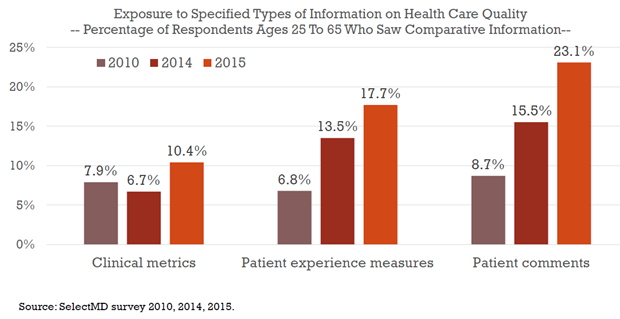
Two weeks ago I was jetting off to Washington DC to contribute to a stakeholder event on “Advancing the Science and Implementation of Patient Narrative Elicitation and Reporting”, at the invitation of the US Agency for Healthcare Research and Quality (AHRQ).
As I understand it (and I am a bit sketchy), the federal government requires the majority of US hospitals and some other kinds of provider to undertake an annual survey of patient experience, the Consumer Assessment of Healthcare Providers and Systems (CAHPS). The purpose of the survey is to inform healthcare consumers, insurers and others, and to help providers make improvements.
Increasingly, though, consumers are turning not to validated survey results, but to reviews and ratings posted online by other patients, as this slide presented by Lise Rybowski so clearly shows:
And there is some evidence that this might be a good thing: online “patient narratives” may highlight areas not included in the CAHPS surveys, may be more accessible and meaningful to consumers than survey results, and may be more timely.
In the light of this, the stakeholder event was convened to discuss issues such as: what are the risks and benefits of narratives as compared with metrics? Do online narratives help people make better decisions, or the opposite? Should the national CAHPS surveys include and publish patient comments? And if so, how?
Different system, same issues
As one of only two UK participants, I was expecting to find the US health system incomprehensible, and the issues surrounding online narrative feedback to be very different from those we know from the UK experience.
Well, I did find the US health system hard to understand (much like many Americans, I suspect). On the other hand, it turned out that online narrative feedback faces many of the same questions, opportunities and obstacles that we see in the UK and Australia. People worry about confidentiality, defamation, representativeness. Yet they also see great opportunities in terms of learning, empowering patients, building trust, improving quality, and shifting the often paternalistic cultural assumptions of healthcare providers.
The question of purpose
A central question that emerged from the discussions was the question of purpose: who are the narratives for? When we ask a patient or carer to “post a comment”, what are we really asking them to do? Are they speaking truth to peers, or to power?
Three assumptions about purpose seem most prevalent:
- Customer service: the interaction is to address an issue. The primary beneficiary is me
- Consumer review: the review is to inform consumer choice. The primary beneficiaries are others like me.
- Quality improvement: the feedback is to help improve care. The primary beneficiary is the service provider.
These all seem to be worthwhile, important purposes (and of course there are others too). Can we address all these purposes at once, or do they require different systems?
Our approach at Patient Opinion has been always to keep the “feedback donor” at the heart of what we do. We think that too often those who give feedback are seen simply as data sources, to be ignored once we have “captured” their views. We wanted to change that.
But if we make feedback open, then we also enable many other people, with other interests, to learn from the stories being told. On Patient Opinion those others include other patients and carers, healthcare providers, commissioners, regulators, researchers, educators, students, patient organisations, policy makers and elected representatives.
So perhaps Mark Schlesinger, professor of health policy at Yale, summed it up best the day after the workshop: “the purpose of all this is to induce learning”. And that’s a motto we can live by.
Crossing the pond
Crossing the pond https://www.careopinion.org.uk/resources/blog-resources/1-images/62d4b02b67af483eaf8072730a0707b7.png Care Opinion 0114 281 6256 https://www.careopinion.org.uk /content/uk/images/logos/co-header-logo-2020-default.pngUpdate from Care Opinion
Posted by James Munro, Chief executive, Care Opinion, on
Thanks for your feedback.

